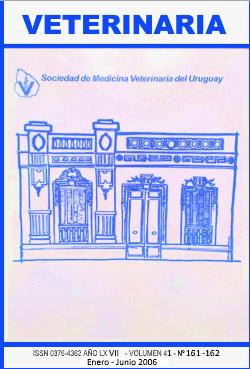Preliminary assessment of the risk of gestation toxaemia in sheep under different nutritional management and under fasting for 48 hours
Keywords:
Sheep, Starvation, Pregnancy toxaemiaAbstract
Pregnancy toxaemia is one of the most important syndromes affecting sheep production in Uruguay, frequently observed in ewes with simple gestation, mainly in rigorous winters associated to nutritional deficiency. The aim of this work was to evaluate the metabolic disorders related to pregnancy toxemia in ewes under experimental starvation. Fourteen Corriedale ewes between 4-6 years were synchronized, and mating was considered as day 0 of gestation. By day 100 of gestation which was ultrasonography confirmed, ewes were divided at random in two groups; one of them fed on natural and the other in artificial grasslands. When reaching 142 days of gestation, half of each group were starved for 48 hs. Glicaemia, uremia, cortisol, ketonuria and body weight were registered. Starvation during late gestation was not severe enough to produce metabolic alterations considered as characteristic of pregnancy toxaemia. Ewes with better energetic storage underwent lower risk of developing the condition. Among studied variables, urinary ketones were the earliest indicators of starvation induced metabolic changes.











